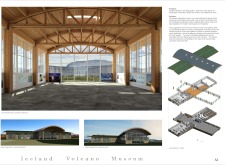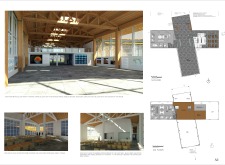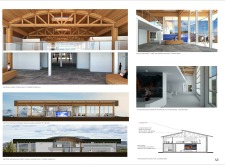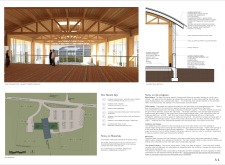5 key facts about this project
The Iceland Volcano Museum is designed to serve as an educational and interpretative center focused on volcanic activity and its significance within Iceland’s landscape. This architectural project integrates facilities for exhibitions, visitor services, and administrative functions. The museum’s primary aim is to enhance public understanding of volcanoes, their behaviors, and their impact on the environment and society.
The main exhibition area features large glass facades that provide unobstructed views of the surrounding volcanic terrain, emphasizing the relationship between the exhibits and the natural environment. The structure integrates large gallery spaces, a cafeteria, and office areas into a cohesive layout that allows for fluid movement throughout the building.
The architectural design showcases a strong focus on blending with its geographical context. By utilizing local materials such as glued laminated timber and natural stone, the museum maintains a visual connection with its surroundings, adhering to a more sustainable approach that aligns with current environmental considerations. The use of high-performance glass ensures energy efficiency while enabling maximum natural light, thereby improving the visitor experience.
Interiors are accentuated by high ceilings and exposed timber, creating an inviting atmosphere that encourages exploration. The careful arrangement of spaces ensures visitors can navigate easily while comfortably engaging with the exhibits.
A Unique Approach to Regional Context What distinguishes the Iceland Volcano Museum from other similar projects is its acute design response to the local environment and culture. The deliberate choice of materials not only reflects Iceland's traditional building practices but also underscores the project’s thematic focus on volcanic geology. The integration of open, airy spaces allows visitors to appreciate the natural landscape, linking indoor experiences with outdoor vistas.
Moreover, the architectural layout includes various vantage points that facilitate visual continuity between the exhibits and the landscape. This seamless connection, alongside the use of regional materials, results in a structure that feels integrated with its setting rather than an imposition upon it.
Sustainability and Functionality Sustainability is a critical component of the museum's design, exemplified by the incorporation of energy-efficient technologies and sustainable materials. The structure promotes efficient energy use through adequate insulation and strategic orientation, which minimizes heating requirements in the harsh Icelandic climate. The building's site planning includes permeable concrete for exterior spaces, enhancing stormwater management and reinforcing eco-friendly principles.
In summary, the Iceland Volcano Museum is a significant architectural endeavor that merges function with context-sensitive design. The project's thoughtful execution illustrates a balance between visitor engagement, educational purpose, and environmental responsibility. For a deeper insight into the architectural plans, sections, and detailed designs, exploring the project further is encouraged.


























